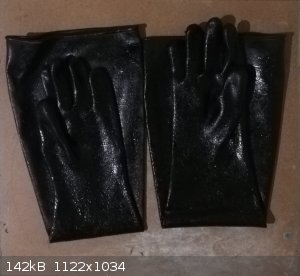rockyit98
Hazard to Others
  
Posts: 283
Registered: 12-4-2019
Location: The Known Universe
Member Is Offline
Mood: no mood is a good mood
|
|
making high chemical resistance silicone coated gloves
as you know gloves are very impotent for safety.but most gloves are made from rubber (isoprene ,neoprene ,Butyl, Nitrile,) ,not so chemical
resistant pvc are good but can't compare with PTFE or Viton. which are very expensive.
we all know silicone has reputation for chemical resistant.but i search for gloves that are made from silicone but they are used for cooking.
then i had an idea to coat normal gloves with silicone sealant.that was a epic failure because it got peeled off quickly.after a while i got my hands
on a low viscosity RTV silicone that claiming to stick to rubber.did some tests and t was a success.got my self a long sleeved gloves and put them on.
with generous amount of silicone and washed my gloved with them.hang them to dry and after a while put on another coat on top the old one.let it dry
and was good to go.tried to see if it will peel off.and no it didn't.
now i have set of gloves that con use with con. NaOH Con. H2SO4 even 70% HNO3. if you try to repeat this work use low viscosity RTV silicone,do a test
sample to see whether if it bond to rubber.use well ventilated area as it gives off fumes of acetic acid.get help from another individual as you do
this.read instructions in silicone tube.

"A mind is a terrible thing to lose"-Meisner
|
|
|
MrHomeScientist
International Hazard
    
Posts: 1806
Registered: 24-10-2010
Location: Flerovium
Member Is Offline
Mood: No Mood
|
|
Here's a handy resource when considering gloves: the Ansell Chemical Resistance Guide https://ehs.unc.edu/files/2015/09/Ansell_8thEditionChemicalR...
It doesn't mention silicone, so I can't say how much more effective it is than other glove types. Interesting idea though.
|
|
|
Ubya
International Hazard
    
Posts: 1232
Registered: 23-11-2017
Location: Rome-Italy
Member Is Offline
Mood: I'm a maddo scientisto!!!
|
|
"now i have set of gloves that con use with con. NaOH Con. H2SO4 even 70% HNO3"
did you test that or it is just an assumption?
---------------------------------------------------------------------
feel free to correct my grammar, or any mistakes i make
---------------------------------------------------------------------
|
|
|
rockyit98
Hazard to Others
  
Posts: 283
Registered: 12-4-2019
Location: The Known Universe
Member Is Offline
Mood: no mood is a good mood
|
|
Quote: Originally posted by Ubya  | "now i have set of gloves that con use with con. NaOH Con. H2SO4 even 70% HNO3"
did you test that or it is just an assumption? |
tested! ones i used normal rubber stopper make a mold out of POP and made a proto putty https://www.youtube.com/watch?v=7fwytA5r2Mw (used powdered borosilicate instead of corn starch) stopper it worked well for 70% HNO3 and 98%
H2SO4.
Grant we miss You!
"A mind is a terrible thing to lose"-Meisner
|
|
|
Sulaiman
International Hazard
    
Posts: 3558
Registered: 8-2-2015
Location: 3rd rock from the sun
Member Is Offline
|
|
my 2 cents worth on gloves :
Before you buy gloves check out the AQL,
I use AQL 1.5 so that means that up to 1.5% of my gloves have holes !
How confident can you be that diy glove coatings are, and will remain, hole-free ?
Although I have disposable nitrile and latex gloves, and a pair of butyl rubber gloves,
I have significantly reduced my usage of gloves as my hands sweat when using them,
which makes it impossible to determine if something has passed through them until it is too late,
much better (in most cases) to use bare hands and care - with washing facilities nearby.
I do use gloves for chemicals that stain, such as silver nitrate, iodine solutions and many others.
NOTE : I have not worked with highly toxic materials such as HF, methyl mercury, nerve gasses, bio-hazards etc. where many rules must apply,
the above applies mainly to acids, bases, oxidisers and other chemicals common to hobby level (mostly inorganic) chemistry.
BUT
I put on my goggles as soon as I start any chemistry
- even just moving stuff from one container to another.
CAUTION : Hobby Chemist, not Professional or even Amateur
|
|
|
rockyit98
Hazard to Others
  
Posts: 283
Registered: 12-4-2019
Location: The Known Universe
Member Is Offline
Mood: no mood is a good mood
|
|
my gloves are heavy duty ones they are thick and about a pound in mass. if you feeling adventurous just turn them inside out and do the same coating
too.to be absolutely sure just double bag it inside. i haven't deal with HF too but do a test before.
"A mind is a terrible thing to lose"-Meisner
|
|
|
draculic acid69
International Hazard
    
Posts: 1371
Registered: 2-8-2018
Member Is Offline
|
|
I think that vinegar smell from the silicon is actually some organosilicon compound.i looked it up after helping fix up a bathroom and googled
it.theres some silicon chemical that smells like vinegar.
|
|
|